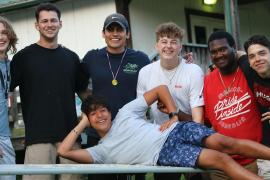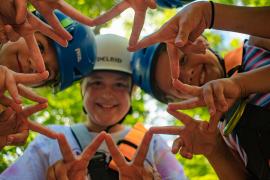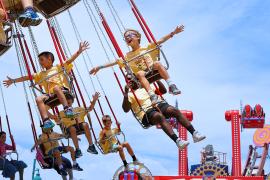Imagine a fun college summer working at camp, where, as with any other internship, young adults gain knowledge, skills, and hands-on experience while making important connections for their future. Summers working at camp practicing career-enriching, human performance competencies are more valuable to young people than ever before.
According to the World Economic Forum, the coming Fourth Industrial Revolution builds on the innovation of the Third Industrial Revolution to transform industry all over the globe, such as: artificial intelligence, the Internet of things, self-driving vehicles, nanotechnology, renewable energy, quantum computing, and biotechnology (Gray, 2016). With the evolution of these new fields, emerging markets will require a novel set of uniquely human skills for employment — the same skills we teach at camp.
On a daily basis working at camp, staff members practice 21st-century skills that will be more valuable than ever in the new age. According to the World Economic Forum, the top ten skills needed to thrive in 2020 and beyond are:
- Collaborative problem-solving
- Critical thinking
- Creativity
- People management
- Coordinating with others
- Emotional intelligence
- Judgment and decision-making
- Service orientation
- Negotiation
- Cognitive flexibility (Gray, 2016)
Camp staff members are immersed in these skills and learn to teach them to their campers. In doing so, the camp staff community becomes a self-motivated culture of learning and leadership where camp staff adopt a growth mindset in which they not only seek to fulfill their own potential, but also choose to do it in a way that promotes positive change individually and globally. They learn to focus purposefully on why they do what they do. They adopt healthy habits and make meaningful contributions to the world and the future.
Camp staff experiences are rich in core social and emotional learning experiences. Camp staff learn whole-body listening, verbal skills, and intuitive awareness of others. They develop and facilitate collaborative and mindfully reflective programs. They become more flexible and adaptable and hone their negotiation skills, assertiveness, and decision-making abilities. They learn to juggle and prioritize, plan and coordinate. They exercise their ability to switch between thinking about two different concepts and to think about multiple concepts at once. They learn valuable community leadership lessons involving inclusion, servant leadership, and citizenship. They become more comfortable debating ideas, managing conflict, and regulating their emotions. They learn to become more adept at giving and receiving feedback. Each of these skills is critical in work and life today, and will be even more so in the coming human-skills-centered economy. All of this is experienced in an unplugged, undistracted, human-powered community that is authentic, intentional, and powerfully addictive in a wonderful way.
Camp professionals know how important staff culture is to the success of their camps. Achieving a highperforming staff culture results from creating a work environment infused with caring relationships, high expectations, purpose, meaningful participation, and a healthy measure of autonomy. When our Generation Z staff members feel emotionally and physically safe; when they feel they belong and are afforded respect; and when we offer them challenge and opportunities for mastery, we create a high-performance, young-adult learning environment. In this enriching community, we build in coaching and evaluation processes that focus not just on personal success in the current summer season, but on practicing competencies that will benefit each staff member years later, well into their professional career and life. In this way, summers invested in working with children at camp are essential formative career and personal development experiences for all young adults, especially upon the backdrop of the coming automation of the Fourth Industrial Revolution.
As camp professionals, we must understand and reinforce the development of these 21st-century skills. At the American Camp Association, we will continue to study and understand these trends, research their impact, and promote their relevance.
Reference
- Gray, A. (2016, January 19). The 10 skills you need to thrive in the Fourth Industrial Revolution. World Economic Forum. Retrieved from weforum.org/agenda/2016/01/the-10-skills-you-need-to-thrive-in-the-fourth-industrial-revolution/



